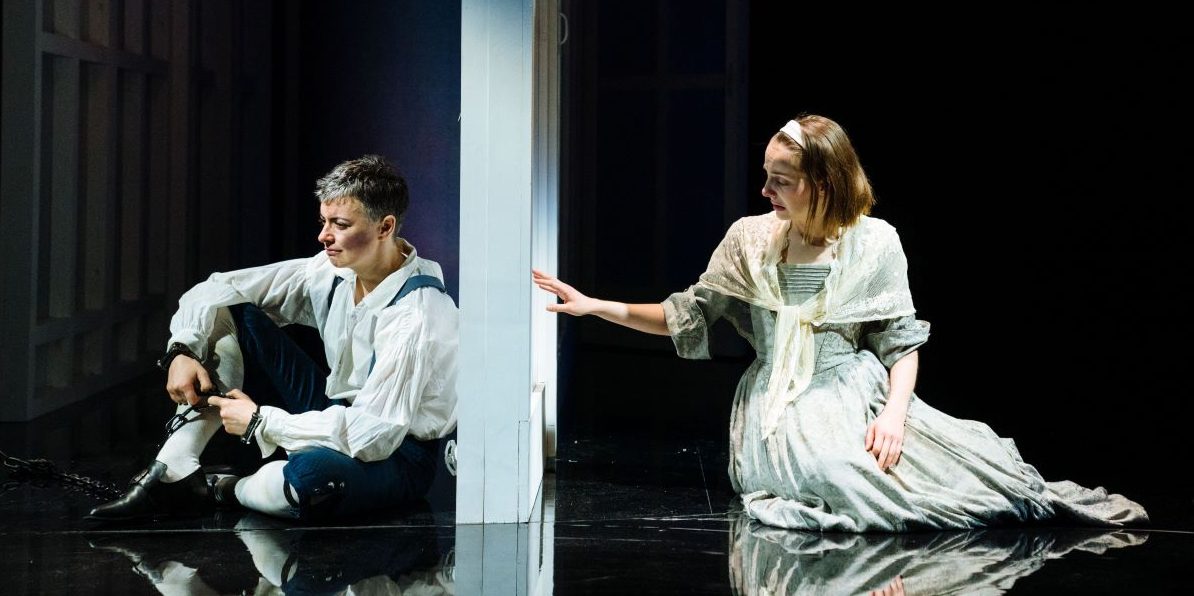It is a bold author who seeks to dramatize gender identity at present when cultural divisions run so deep; but in her new play Ruby Thomas dives back into history to find a platform in which she finds comedy, pathos, wit and nuance in abundance. Just as with the current dramatization of Virginia Woolf’s ‘Orlando’, once you take the issues back through time it is easier to celebrate and embrace difference free of the fire and smoke of current culture wars.
Thomas creates a very plausible back story for records of a Prussian trial she came across in the British Library. The focus is the relationship between Anastasius Linck and Catherina Mühlhahn, who were condemned for sodomy in 1721, when it was discovered by Catherina’s mother that Linck had been designated as a woman at birth. After the subsequent trial Anastasius was executed and Catherina imprisoned despite the fact that no identifiable harm had resulted to others from their entirely consensual and happy marriage.
The first half of the evening brings the characters to life with a verve and energy in a way that is historically informed but also timeless and immediately accessible. Anastasius, played with winning charm and edgy anxiety by Maggie Bain, is an exemplary soldier, popular with his comrades, who deserts when his identity is likely to be revealed and reinvents himself with a stolen identity. Catherina is at odds with society in her own way, as she resists her bossy mother’s attempts to marry her off advantageously to a wholly unsuitable suitor. Helena Wilson projects just the right blend of beady intelligence and wilfulness to bring this girl to vivid life. In particular the duelling with the conventional platitudes of her mother, excellently played by Lucy Black, develops a detailed picture of the restrictions on the opportunities available to talented women and how that burden is passed down the generations.
At the centre of the swirl of action is a very credible and touching relationship that is presented as wholly natural and unforced, testimony to the variety of ways in which human beings can connect and share a love of life and each other once the blinkers of conventional stereotypes are set aside. The skill of the actors and the deftness of the writing allow us to look at the issues in the round both within and beyond historical setting. The outsiders are seen to have a better grip on core human values than the formal definitions provided by wider society.
The first half has perhaps few too many highways and byways and might have benefited from some pruning and tightening up, but there is always great technical skill in presenting the action. Members of the cast double up in small roles and the revolve set by Simon Wells transforms slickly from domestic to exterior locations and ultimately into a courtroom and place of execution. This is a long evening, but the many short scenes slip easily by with a cumulative power and panache.
In the second, and shorter half, we reach the trial. The tone becomes darker and more formal, and the human and stylistic variety is restricted – appropriately – and replaced by cold legalistic posturing and diminished and damaged principals. Brave defiance and determination to witness to essential truths emerge powerfully at the very end as both leads seek ways to embody the play’s central message: ‘It is life’s great aim. To find a way to be honest with oneself, even as the world pretends around you.’
Among the supporting cast there is excellent work by Marty Cruickshank as the elderly Catherina, a narrator figure looking back with pride and regrets on her earlier life; Daniel Abbott, as a bumptious, self-important lawyer; Qasim Mahmood, as a sympathetic fellow soldier, and Leigh Quinn as the quintessential ‘tart with a heart.’ A lot of care has also gone into lighting and sound design: the first half is shot through with shadow and warm mystery, whereas the trial scene is presented in clear and clinical brilliance. Wisps of mutated Bach cello suites float aptly in and around the action, though the brutal bursts of modern music are perhaps too crudely emphatic in breaking up the historical setting.
At a time when the focus on new writing at Hampstead is in such doubt, this play stands as a resounding vindication of the importance of that investment, and it is no accident that Thomas’ work is currently a finalist in the Susan Smith Blackburn Drama Prize. It would be a deserving winner.

